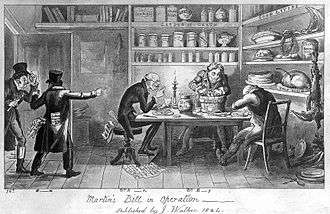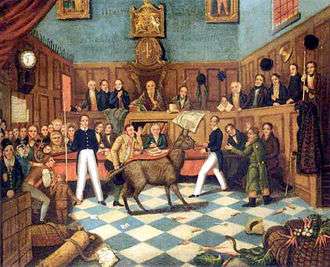Richard Martin (Irish politician)


Colonel Richard Martin (15 January 1754 – 6 January 1834), was an Irish politician and campaigner against cruelty to animals. He was commonly known as "Humanity Dick", a nickname bestowed on him by King George IV. He succeeded in getting the pioneering Cruel Treatment of Cattle Act 1822, nicknamed 'Martin's Act', passed into British law.[1]
Early life
Martin was born at Ballynahinch Castle, County Galway, the only son of Robert Martin FitzAnthony of Birch Hall, County Galway, and Bridget Barnwall, a daughter of Robert Barnewall, 12th Baron Trimlestown. He was raised at Dangan House, situated on the Corrib River, four miles upriver from the town of Galway. His father's family were Jacobites and one of "The Tribes of Galway", fourteen merchant families who ruled Galway from the 14th to 17th centuries. The Barnwalls were an ennobled family of Norman descent based in the counties of Dublin, Kildare and Meath in Leinster. Bridget Barnwall died when Richard was nine years old. Richard's father later married Mary Lynch, a member of another "Tribal" family, with whom he had sons Robert and Anthony. Though both of his parents were born to Catholics, Richard Martin was raised a Protestant and educated in England and later became a wealthy landlord in Ireland.
Catholic Emancipation
Martin entered the Irish House of Commons in 1776, sitting for Jamestown until 1783. He was appointed High Sheriff of County Galway in 1782.[2] After a break of fifteen years, he was returned to Parliament for Lanesborough in 1798, promoting Catholic Emancipation. Just before the Act of Union dissolved the Irish Parliament and obliged Irish MPs to sit in the Parliament of the United Kingdom, he was elected for Galway County. He continued to represent Galway County in Westminster as a political independent until 1812 and again from 1818, supporting the Tory government of Lord Liverpool. In the House of Commons he was known for his interruptions and humorous speeches. He continued his work towards Irish Catholic Emancipation till 1826, when he had to flee to France. Emancipation was finally granted in 1829, much to his delight.
Animal cruelty
Martin is now best known for his work against animal cruelty, especially against bear baiting and dog fighting. His actions resulted eventually in Martin's Act of 1822, entitled "Ill Treatment of Cattle Bill". He also tried to spread his ideas in the streets of London, becoming the target of jokes and political cartoons that depicted him with ears of a donkey. He also sometimes paid fines of minor offenders.
On 16 June 1824, Martin was present when the Society for the Prevention of Cruelty to Animals (SPCA) was founded in a London coffee shop "Old Slaughter's". He denied being the initiator of the society.
Active life
Martin also had a very eventful life. He was a colonel of the County Galway Volunteers. He survived two shipwrecks. He fought over a hundred duels with sword and pistol and earned the nickname "Hairtrigger Dick". He travelled extensively in Europe and the Americas during the 1770s and was in New England when the American Revolutionary War began. He initiated Galway's first theatre in 1783.
Martin was on a first-name basis with many of the famous names of his age, including King George IV (who gave him the nickname "Humanity Dick"), Henry Flood, Henry Grattan, William Pitt, Queen Caroline, and Daniel O'Connell. Despite his nickname he was considered a very harsh landlord in Ireland.
On his death in 1834 his son Thomas became his heir. A workhouse was built on his estate during the Irish famine. Although the workhouse was an apparent pledge to help the poor suffering from starvation, it is agreed that the Martins did little to help and approximately 150,000 people died on their land during this period from starvation and fever. Most of Martin's estate (approx. 200,000 acres) was in the west of Ireland and this area had one of the highest death tolls during the Famine.
Unseating and escape
After the election of 1826, Martin (now a heavy gambler) lost his parliamentary seat because of a petition which accused him of illegal intimidation during the election. He had to flee into hasty exile to Boulogne, France, because he could no longer enjoy a parliamentary immunity to arrest for debt. He died there peacefully in the presence of his second wife and their three daughters on 6 January 1834.
Family
Martin's first wife was the Honourable Elizabeth Vesey, a daughter of Lord Trimblestown. They had nine children, of whom only three survived childhood. His daughter, Mary, was born in 1783. Her brothers were Thomas B. Martin (1786–1847) and St. George (died 1805). Following the revelation of her affair with a Mr. Petrie in Paris, Martin sued Petrie for criminal conversation in 1791 and was awarded £10,000. He had this distributed to the poor by throwing it out the windows of his coach on the long journey back from London to Galway.[1]
In 1793, he married the novelist Harriet Evans Martin in Nenagh, and had by her four surviving children, including Rev. Richard Martin (1797–1878) and the writer Harriet Letitia Martin (1801–1891). The latter emigrated to Canada in 1834 and had descendants who included D'Arcy Argue Counsell Martin (c. 1899–1992).
See also
Notes
References
 Courtney, William Prideaux (1893). "Martin, Richard (1754-1834)". In Lee, Sidney. Dictionary of National Biography. 36. London: Smith, Elder & Co.
Courtney, William Prideaux (1893). "Martin, Richard (1754-1834)". In Lee, Sidney. Dictionary of National Biography. 36. London: Smith, Elder & Co. - "Humanity Dick Martin: 'King of Connemara', 1754–1834", Shevawn Lynam, ISBN 0-946640-36-X; Lilliput Press, May 1989.
- The Tribes of Galway, Adrian James Martyn, Galway, 2001.
- "The Eccentric Member for Galway: The Story of Richard Martin, Animal Rights Pioneer", Peter Phillips, ISBN 1-898594-76-7; Parapress, 2003.
- "Richard Martin 'Humanity Dick' (1754–1834)", Stephen Farrell, History Today June 2004
External links
- Hansard 1803–2005: contributions in Parliament by Richard Martin
| Parliament of Ireland | ||
|---|---|---|
| Preceded by James Browne John FitzGibbon |
Member of Parliament for Jamestown 1776–1783 With: Viscount Westport 1776–1781 John Hall |
Succeeded by Sir Francis Hutchinson Henry Bruen |
| Preceded by Edmond Stanley John La Touche |
Member of Parliament for Lanesborough 1798–1800 With: Edmond Stanley |
Succeeded by Edmond Stanley John Kelly |
| Preceded by Hon. Richard Trench Joseph Blake |
Member of Parliament for Galway County 1800 – 1801 With: Joseph Blake |
Succeeded by Parliament of the United Kingdom |
| Parliament of the United Kingdom | ||
| Preceded by Parliament of Ireland |
Member of Parliament for Galway County 1801 – 1812 With: Richard Le Poer Trench |
Succeeded by James Daly Richard Le Poer Trench |
| Preceded by Denis Bowes Daly James Daly |
Member of Parliament for County Galway 1818 – 1826 With: James Daly |
Succeeded by James Staunton Lambert James Daly |